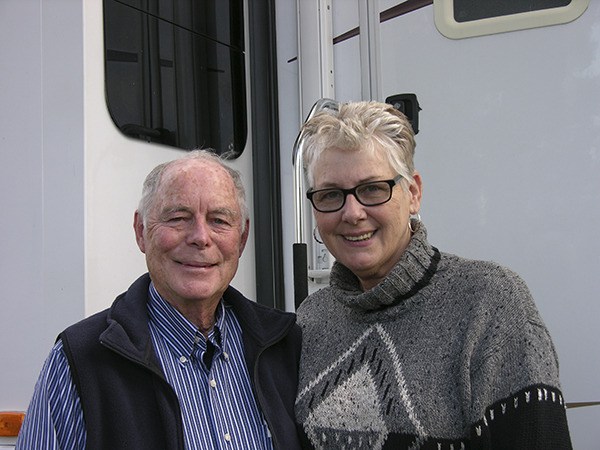Jerry and Caecilia Fryrear have been the park hosts at Carrie Blake Park since October. Jerry says by now he knows “at least a hundred dogs, on a first-name basis.”
His story, though, harks back to an earlier residence, a houseboat on the Mississippi.
“I used to live near Nashville, Tennessee, and I got a job in New Orleans. I owned a houseboat at the time, on a lake in Tennessee. I decided to move on the houseboat, so I sold everything I owned that I couldn’t get on the houseboat.
I traveled on the Cumberland River up through Tennessee and Kentucky and locked through several locks on the Cumberland and then locked through onto the Ohio River and then down the Ohio to just near Cairo, Missouri, and hit the Mississippi and went down the Mississippi all the way to New Orleans.
On the Mississippi there are huge towboats, pushboats, really — I don’t think people can appreciate how big they are. They have these triple engine diesels and each boat will move as many as 42 barges — each one! So they have these barges lashed together six across and seven deep in a great big raft and one of these pushboats will push one of these huge rafts.
When you see one coming up the Mississippi, you’ll swear there’s no room to get past. It just looks that way; actually they pass each other coming and going, it’s such a huge river, but from a distance it looks like there’s no way to get past one of them. As you get closer, you realize you can get past.
The only problem is that they have no respect at all for pleasure boats. They’re like freight trains — they couldn’t stop if they wanted to. So you just gotta watch out for them.
And if you meet one of those rafts of barges fully loaded, imagine how much water they displace with 42 barges full. When you pass one, it tosses you all over the place. It’s a huge wake, and not from the engines so much as from the displaced water that comes rushing back in.
So it’s quite a thrill to meet one of those big barge outfits going down the river.
And when you’re on the river, you can’t just float. The river runs at about six miles an hour, depending on the flood stage, and if you’re just floating you don’t have any control, so you have to go slightly faster than the flow. So we would go about eight miles an hour.
When you get to Baton Rouge, you start running into ocean-going ships that come all the way up to Baton Rouge, which is almost a hundred miles from the Gulf of Mexico.
To protect ourselves at night we would get up in shallow water where we knew the towboats could not possibly go up there and tie up to a tree. Which was OK, except one time we did that and the water in the river was dropping down — it had been at flood stage — and overnight it dropped about three or four inches and stranded us.
It took about a day and a half before we flagged down a couple of guys who were fishing and they came over and they helped us push the houseboat off. But we were almost dry for a while.
When we got to New Orleans, we were going to berth in a little town called Lafitte, so we locked out of the Mississippi into this bayou. I can’t tell you what a relief it was to get up in this bayou because it was calm and peaceful with no traffic except little fishing boats.
That trip was quite an experience. It took about two weeks to go 1,400 miles on the river.”
Everyone has a story and now they have a place to tell it. Verbatim is a first-person column that introduces you to your neighbors as they relate in their own words some of the difficult, humorous, moving or just plain fun moments in their lives. It’s all part of the Gazette’s commitment as your community newspaper. If you have a story for Verbatim, contact editor Michael Dashiell at editor@sequimgazette.com.



